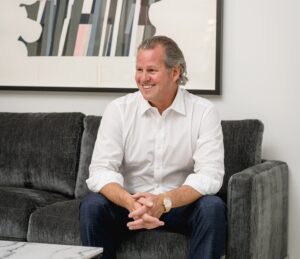
Glenn Gehan, founder and CEO of GFO Home, extols the benefits of owning a plane for busy executives: “An airplane is like a time machine. It saves you literally days of your life.”
Homebuilding is a bit of a family tradition for Glenn Gehan. Five generations of his family are represented among the owners of his company GFO Home, from Glenn’s grandfather — who shares his name — to his grandson Andrew.
“You don’t get many five-generation American homebuilders,” Gehan said.
Gehan’s father owned a homebuilding company, which his grandfather invested in. Further back, his great-grandfather was a major landowner in South Dakota. But it wasn’t always a given that Gehan would follow in their footsteps.
As a kid, he was inspired by a neighbor who lived at the end of the cul-de-sac, and he spent his childhood thinking he would someday grow up to be a dentist. His distaste for blood put an end to that particular career aspiration.
After college, he kept his options open. He ended up with two job offers: one at a big bank and one at Pulte Homes. The homebuilder was offering no salary, only commission. Still, Gehan saw the potential.
“I remember thinking, someday I could own a homebuilding company, but I’ll probably never own a bank,” Gehan said.
He took the homebuilding job.
He spent his early 20s bouncing around major U.S. cities — Detroit, Tampa, Orlando — but he eventually found his way back to Dallas, where he started Gehan Homes with his brother Tim.
The company grew into one of the largest volume homebuilders in the country. The brothers made waves in 2014 when they began the process of selling the company, a deal that was completed in 2016. After a two-year noncompete agreement expired, Gehan kickstarted his next business endeavor: GFO Home.
Now, GFO Home is at the top end of production homebuilding, with an average sale price in Austin of $900,000. Austin Business Journal spoke with Gehan to learn more about the man behind the homebuilding legacy.
You sold half of Gehan Homes in 2014 and the other half in 2016. What was the thought process behind selling your namesake company?
We started when I was in my mid-20s. With my brother, we borrowed a little bit of money from my dad, and we started out one subdivision at a time. We learned on the job. Eventually, that company became the 11th-largest private Homebuilder in the United States.
I ran that company with my two brothers, Peter and Tim. We got to the point where the company got so big that we needed professional management to go on to the next level. That’s a whole new level and a big commitment, lots of risk.
We had to decide whether to do that or take the money off the table. We all decided it had been a great run, and it was a huge win-win for us as the sellers and for Sumitomo Forestry America Inc., which bought it. And they have created billions of dollars of enterprise value since they bought the company, and all of our managers are still there. It was a fantastic outcome for everyone, and that’s not that common.
Now you own another homebuilding company. Was that always the plan, or were you drawn back in?
When we decided to sell Gehan Homes, I knew I was going to continue to work full-time for at least 15 more years. I was in my late 40s, and I just really enjoy working. I knew that working was just part of the balance in my life. So I knew from day one that I was going to start GFO Homes.
I heard through the grapevine you’re very into airplanes. What’s the story behind that interest?
I’ve always loved airplanes. I’ve owned airplanes for over 20 years.
An airplane is like a time machine. It saves you literally days of your life. Corporate airplanes can get a bad rap, but I call them copy machines. It’s just a machine, but what that machine does is it gets you days of your life back literally every month.
I’ll give you an example. I was at my place in Austin and had a really productive morning. Then I left Austin, and I was in Dallas in like 28 minutes, and went to my office and had a productive afternoon in my Dallas office. That’s two days of work.
Would you consider travel one of your hobbies?
Definitely. I traveled for fun probably 15 weeks a year between selling Gehan Homes and starting GFO Home. The more I travel, the more I like it. I was in Southern France for eight or nine days a few weeks ago. I’m going to the West Indies here in another
month. Having an airplane makes it really, really easy to do that.
What advice would you give to someone who’s just starting out in homebuilding and wants to establish a legacy like yours?
I would tell them to go work for a good public builder and do as many different jobs as they can for the first five years.
You’re very involved with Mobile Loaves & Fishes and other causes addressing homelessness in the area. What draws you to this cause in particular?
I’m very interested in homelessness — the causes of it, what the solutions are going to be. We need people dedicated to trying find a solution. Everybody knows we don’t know the answers to these questions yet, but I’m hopeful that in my life, we’re going to figure this out and make a difference. I think one of the good things about Austin and Texas in general is that we’re not going to have as many barriers to trying these solutions as you would in other places. Texans are much more open to trying different things, and we have some of the best land use policies in the United States.
If you could only eat at one Austin restaurant for the rest of your life, what would it be?
Lin Asian on Sixth Street. They’ve got great dim sum.
What is it about the homebuilding industry that has such staying power with you and your family?
Once I got into it, my father was supportive. We would talk on the phone, and he would ask me a million questions about what I was doing at work. I enjoyed my work, and I was successful. In any career, you’re going to get better at it as you go along. You just are and that’s one of the greatest things about staying with the same industry. When we decided to sell Gehan Homes, we were getting really good at it, but it took me 20 years to get good at it. I enjoy it more now today, honestly, than I ever have enjoyed it. That’s a great feeling, when you’re enjoying your work more now than you did 20 years ago. In homebuilding, every day is different. If I were a dentist, that probably wouldn’t be the case.
Media contact, Brenda Thompson, brenda@brendathompson.com



